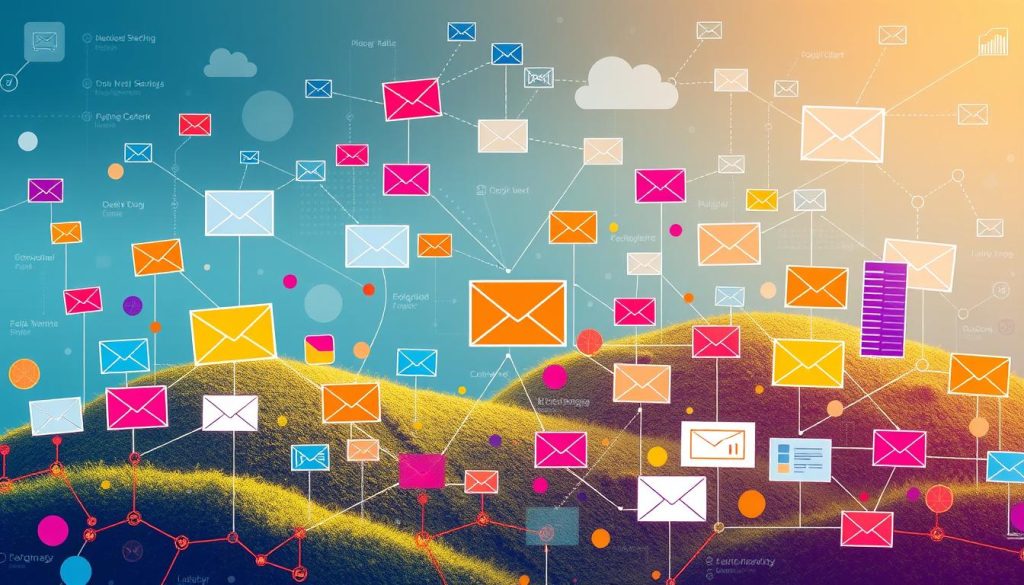In today’s fast-paced digital world, cold email campaigns are key for lead generation and building business relationships. The success of these campaigns depends on picking the right email mailboxes. This guide will help you make informed choices, improve your cold email outreach, and achieve great results for your business.
Key Takeaways
- Understand the importance of choosing the right email mailboxes for your cold email strategy
- Learn about the different types of email accounts and their suitability for cold email campaigns
- Discover the impact of email deliverability on your campaign’s success
- Explore techniques for avoiding spam filters and ensuring high inbox placement
- Uncover the benefits of email list building and the risks of purchasing email lists
Introduction to Cold Email Marketing
Cold email marketing is a key strategy in B2B lead generation. It helps companies reach out to potential customers and grow. By sending personalized emails to a selected list, businesses can introduce their offerings and connect with new prospects.
This method has many benefits for businesses aiming to expand their customer base. It lets companies talk directly to decision-makers, avoiding traditional barriers. This targeted approach can lead to better response rates and a more efficient lead generation process.
Effective cold email campaigns also boost a company’s B2B lead generation efforts. By using data and personalization, businesses can create messages that capture the audience’s attention. This can encourage actions like scheduling meetings or showing interest in the solutions offered.
We will explore cold email marketing further in the next sections. We’ll look at its strategies, best practices, and the importance of a quality email list for successful campaigns.
Importance of Email List Building
Building a strong email list is key for your cold email success. A good list boosts your delivery and engagement. It also opens doors to more sales. So, spending time on building your list is worth it.
Benefits of a Targeted Email List
- Improved deliverability: A targeted list avoids spam filters, getting your emails to the right people.
- Higher engagement rates: Emails to the right people grab attention and spark real conversations.
- Better conversion opportunities: Talking to people who care about what you offer boosts your chances of making a sale.
Risks of Purchasing Email Lists
Buying an email list might seem easy, but it’s risky. These lists often have old or uninterested contacts. This leads to poor delivery, high bounce rates, and more spam.
| Metric | Targeted Email List | Purchased Email List |
|---|---|---|
| Deliverability | High | Low |
| Engagement Rates | High | Low |
| Conversion Rates | High | Low |
The downsides of buying email lists are too big to ignore. A targeted email list built with care is safer and more effective. It’s the smart way to grow your business.
“Building a strong, targeted email list is the foundation for successful cold email marketing. It’s not a shortcut, but it’s the most reliable path to sustainable growth.”
Understanding Email Deliverability
Getting your emails to the right inbox is key in cold email marketing. Email deliverability means your emails actually reach the person you’re trying to contact. It’s not just about sending emails; it’s about making sure they get there.
Knowing what affects email deliverability is vital. This knowledge helps your outreach efforts succeed.
Factors Affecting Email Deliverability
Several important factors can change how well your emails are delivered:
- Sender Reputation – Your reputation as an email sender matters a lot. It’s based on your domain history, IP address, and how people have interacted with your emails before.
- Email Content – What you write in your emails can set off spam filters. This includes the subject line, body, and any attachments or images.
- Recipient Engagement – How people react to your emails affects your deliverability. This includes whether they open your emails, click on links, or mark them as spam.
- Spam Filter Algorithms – Email service providers use these algorithms to find and block spam. They keep changing to stay ahead of spammers.
By knowing these factors and adjusting your email strategy, you can boost your cold email success. This means more of your emails will reach the right inbox and connect with your audience.
“Email deliverability is the foundation of any successful email marketing campaign. By addressing the key factors that impact it, you can maximize the reach and impact of your cold email outreach.”
Choosing the Right Mailboxes for Cold Email Outreach: A Comprehensive Guide
Choosing the right email mailboxes is key for a successful cold email campaign. This guide will help you pick the best email accounts for high deliverability and engagement. It’s all about making your emails reach the right people.
First, think about the type of email account. Personal email accounts work well for small outreach efforts, adding a personal touch. But for big cold email outreach campaigns, business email accounts are better. They have more authority and credibility.
Another important thing is the domain reputation of your email mailbox. Domains with good deliverability and low spam rates are more likely to get to the inbox. Choosing reputable domains can help your cold email messages reach their targets.
| Email Mailbox Type | Advantages | Disadvantages |
|---|---|---|
| Personal Email Accounts |
|
|
| Business Email Accounts |
|
|
By choosing the right email mailboxes for your cold email outreach campaign, you can increase your success. You’ll also build strong connections with your audience.
Types of Email Mailboxes
Choosing the right email mailbox is key to cold email marketing success. It’s important to know the difference between personal and business email accounts. Each has its own unique features.
Personal Email Accounts
Personal email accounts, like Gmail, Yahoo, or Outlook, are for personal use. They tend to be more casual and friendly. But, they might make your emails seem less professional.
They also face more spam and delivery problems. This is because personal accounts are less trusted by email services.
Business Email Accounts
Business email accounts, such as name@company.com, show authority and trust. They are seen as more professional and reliable. Plus, they have fewer delivery issues.
When picking email mailboxes for your campaigns, think about tone, professionalism, and delivery. Knowing the differences between personal and business accounts helps you choose wisely. This aligns with your marketing goals and what your audience expects.
“The choice of email mailbox can make or break your cold email campaigns. Carefully consider the pros and cons of personal and business accounts to ensure maximum impact and deliverability.”
Email Warmup Process
Starting a cold email marketing campaign is more than just writing good messages. A key step is the email warmup process. It makes your new email accounts seem credible and trustworthy. This helps improve email deliverability and inbox placement.
The warmup process builds a good reputation for your email accounts. It shows email service providers (ESPs) that your accounts are real and active. By sending more emails and engaging content, you show ESPs that your accounts are worth delivering to the inbox.
There are many benefits to a good email warmup process:
- Enhanced email deliverability: Warmed-up mailboxes are less likely to be seen as spam. This means your emails are more likely to reach the right people.
- Improved inbox placement: ESPs will send your emails to the main inbox more often. This is because they see your accounts as trusted senders.
- Increased engagement: A warmed-up mailbox gets more opens, clicks, and responses. This is because it has a good reputation and followers.
Starting the email warmup process takes time and strategy. But, it’s worth it for your cold email marketing. By warming up your mailboxes, you make your cold email campaign more likely to succeed.
| Step | Action |
|---|---|
| 1 | Create and set up your new email accounts |
| 2 | Send a mix of personal and professional emails to build engagement |
| 3 | Gradually increase the number of emails sent per day |
| 4 | Connect the accounts to relevant social media profiles |
| 5 | Monitor the email performance and adjust the warmup strategy as needed |
By following these steps, you can warm up your email accounts. This will help your cold email campaign succeed in terms of email deliverability and inbox placement.

Email Verification Tools
In the world of cold email marketing, having a clean email list is key. Email verification tools are essential for this. They help make sure your emails reach the right people by removing bad addresses.
Benefits of Email Verification
Using email verification in your cold email strategy has many benefits. Here are a few:
- Improved deliverability: It helps your emails get to the right people.
- Reduced bounce rates: It cuts down on emails that bounce back, which is bad for your reputation.
- Better data hygiene: It keeps your email list clean and accurate.
- Increased engagement: It helps you focus on people who actually want to hear from you, leading to better results.
| Email Verification Tool | Key Features | Pricing |
|---|---|---|
| Mailgun | Batch email verification, real-time validation, and email bounce analysis | Starts at $0.10 per verification |
| Kickbox | Powerful email verification API, email list cleaning, and deliverability insights | Starts at $0.01 per verification |
| ZeroBounce | Comprehensive email validation, fraud detection, and advanced analytics | Starts at $0.008 per verification |
Email verification tools are crucial for successful cold email campaigns. They lead to better engagement, improved delivery rates, and a higher return on investment for your business.
Avoiding Spam Filters
In the world of cold email marketing, avoiding spam filters is key. You need a smart plan to make sure your emails land in the right inbox. Knowing what affects email deliverability and using best practices can help your cold emails get seen.
Creating great subject lines is a big part of avoiding spam filters. Stay away from spammy words, too much punctuation, or all-caps. Instead, aim for short, personal subject lines that grab attention without raising red flags.
It’s also important to make your cold emails engaging but not too sales-y. Keep your messages balanced and easy to read on any device. This follows the best practices in the industry.
Following email marketing laws, like the CAN-SPAM Act in the U.S., is vital. You must clearly show who sent the email, include a real address, and make it easy for people to stop getting your emails.
“Successful email marketing is all about striking the right balance between engaging content and compliance with industry standards.”
By using these tips and keeping an eye on how well your emails are doing, you can boost your cold email success. This means more of your messages will reach the right people, helping your email marketing do better overall.
Best Practices for Email List Management
Managing your email list well is key to success in cold email campaigns. It’s about keeping your contact list quality high and making your emails more engaging. This helps you connect better with your audience.
Email Segmentation: The Key to Personalization
Segmenting your email list is a smart move. It lets you send emails that really speak to specific groups. This way, you can share information that’s truly relevant to each group. It boosts your email’s success and builds stronger connections.
Some great ways to segment your list include:
- Demographic factors: location, job title, industry, company size, etc.
- Behavioral data: website interactions, content engagement, purchase history, etc.
- Psychographic traits: interests, pain points, goals, and preferences
Email Personalization: Going Beyond Name Insertion
Personalizing your emails is more than just using someone’s name. It’s about making the whole email experience fit the person’s needs. This means offering tailored products, customized content, and even dynamic elements that change based on how they interact with your emails.
By using segmentation and personalization, you can make your email list management more effective. This leads to better customer relationships and better campaign results.

“Segmentation and personalization are the keys to unlocking the full potential of your email list. By understanding and catering to the unique needs of your audience, you can create a more meaningful and impactful email experience.”
Measuring Email Campaign Success
It’s key to track and analyze your cold email campaigns for better results. By looking at important metrics and KPIs, you can make smart choices. This helps improve your email outreach and boosts your email marketing metrics and campaign optimization.
Watching your open rate is crucial. It shows how many people open your emails. A high rate means your subject lines grab attention and your content hits the mark.
The click-through rate (CTR) is also vital. It tells you how many people click on your email links. This shows if your content is relevant and valuable.
- Don’t overlook your conversion rate. It shows how many people take action, like buying something or signing up.
- Lastly, figuring out your return on investment (ROI) shows how well your efforts pay off.
By keeping an eye on these metrics, you can make your cold email campaigns better. You’ll improve your messaging and see better email marketing metrics and campaign optimization.
“Email marketing is a top way to connect with your audience. By tracking your campaign’s performance, you can find ways to succeed even more.”
Integrating Cold Email with Other Marketing Channels
In the digital marketing world, a well-made cold email campaign is very powerful. It works best when combined with other marketing channels. This way, businesses can reach more people, get more leads, and make their marketing better and more effective.
One big plus of mixing cold email with other marketing is reaching people in different ways. For instance, using cold email and social media together can grab the attention of potential customers on many platforms. This makes you more visible and helps you build stronger connections with your prospects.
Using cold email with content marketing is also very beneficial. When your cold email messages match the content you’re sharing, you become a thought leader. This gives your prospects the info they need to make smart choices. This can lead to more leads and better conversion rates.
Paid ads can also work well with your cold email strategy. By matching your cold email campaigns with your paid ads, you can make both channels more effective. This creates a strong and convincing marketing presence.
In the end, combining cold email with other marketing channels can really change the game for businesses. By using the strengths of each channel, you can create a powerful marketing strategy. This strategy will give you the results you’re looking for.
“Integrating cold email with other marketing channels is like a symphony, where each instrument plays a unique role in creating a harmonious and captivating performance.” – Jane Doe, Marketing Strategist
Conclusion
In this guide, you’ve learned key strategies for picking the right mailboxes for your cold email outreach campaigns. You now understand the importance of building an email list, ensuring email deliverability, and knowing the different types of email mailboxes. This knowledge helps you improve your email marketing and lead generation efforts.
It’s important to start with an email warmup process, use email verification tools, and steer clear of spam filters. This way, your emails will likely land in the right inboxes. Always check how your campaigns are doing and tweak your approach as needed. Also, consider combining cold email with other marketing channels for a more effective strategy.
By using the tips from this guide, you’re ready to create successful cold email campaigns. These campaigns will help your business achieve real results.
FAQ
What are the key benefits of building a targeted email list for cold email outreach?
A targeted email list boosts your cold email outreach. It leads to better delivery rates and higher engagement. You can send messages that really speak to your audience.
What are the risks associated with purchasing email lists for cold email campaigns?
Purchasing email lists can be a gamble. They might have low quality, leading to more bounces and spam. It can also hurt your reputation and delivery rates over time.
What are the key factors that affect email deliverability?
Several things affect how well your emails get delivered. These include your reputation, the content of your emails, how engaged your recipients are, and spam filters. Knowing these can help you improve your cold email strategy.
Why is the email warmup process important for cold email outreach?
The email warmup process is key for successful cold emails. It helps your new email account get better delivery and placement in inboxes. This boosts your cold email campaign’s success.
What are the benefits of using email verification tools in your cold email outreach?
Email verification tools are crucial for a good email list. They help ensure your emails get to the right people. This leads to better delivery rates and more effective outreach.
How can you avoid triggering spam filters in your cold email campaigns?
To avoid spam filters, focus on your subject lines and email content. Stick to the rules and use best practices. This helps your emails reach your audience.
What are the key metrics to track when measuring the success of your cold email campaigns?
It’s important to track your cold email campaign’s performance. Look at open rates, click-through rates, conversion rates, and ROI. This helps you improve your strategy and get better results.
How can you integrate cold email outreach with other marketing channels for a more effective lead generation strategy?
Combining cold email with other marketing channels can boost your lead generation. Use a mix of cold email, social media, content marketing, and paid ads. This approach can reach your audience more effectively.


